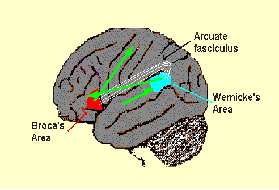|
Language problems usually result from damage to the left temporal and parietal lobes of the brain. Damage to a language center located on the dominant side of the brain, known as Broca's Area, causes expressive aphasia. People with this type of aphasia have difficulty conveying their thoughts through words or writing. They lose the ability to speak the words they are thinking and to put words together in coherent, grammatically correct sentences. Damage to a language center in a rear portion of the brain, called Wernicke's Area, results in receptive aphasia. People with this condition have difficult understanding spoken or written language and often have incoherent speech. Although they can form grammatically correct sentences, their utterances are often devoid of meaning.
The most severe form of aphasia, global aphasia, is caused by extensive damage to several areas involved in language function. People with global aphasia lose nearly all their linguistic abilities; they can neither understand language or use it to covey thought. A less severe form of aphasia, called anomic or amnesic aphasia, occurs when there is only a minimal amount of brain damage, and its effect are often quite subtle. People with anomic aphasia may simply selectively forget interrelated groups of words, such as the names of people or particular kinds of objects.
Wernicke Aphasia (Carl Wernicke, 1858-1904) has two main components. The first is impairment in the comprehension of writing and spoken language. The second is an inability to speak substantive language: often times these patients are unable to form some words correctly and seem to inject words in their sentences that do not fit (paraphasia). These persons cannot function independently in society because they are unable to understand the meaning of written and spoken words, and they are unable to tell others what they want because their own speech is devoid of content. Since there may not be any difficult making the sound of language, another name of this disorder is "fluent or sensory" aphasia.
Emotional Disturbances:
Those that have aphasia may have difficult controlling their emotions and may express inappropriate emotions in certain situations. Many people who survive a stroke feel fear, anxiety, frustration, anger, sadness and a sense of grief for their physical and mental losses. These feelings are a natural response to the psychological trauma of stroke. Some emotional disturbances and personality changes are caused by the physical effects of brain damage.
One common disability that occurs with many people is depression. Signs of clinical depression include sleep disturbances, a radical change in eating patterns that may lead to sudden weight loss or gain, lethargy, social withdrawal, irritability, fatigue, self-loathing and suicidal thoughts. Expression can hamper recovery and rehabilitation and may even lead to suicide. Aphasia can be bewildering. It is not visible, it is complex, it takes different forms and changes over time. It effects major, long-term changes in lifestyle. Some difficulties are common to anyone with an acquired impairment, but language impairment makes it particularly hard to find ways to adapting and revising personal identity.
Aphasia does not fit with perceptions of disability which are commonly based on visible, clearly marked, physical or sensory impairments. Its onset is linked with sudden and dramatic illness, and hopes for recovery can continue for many years. Uncertainty, prejudicial attitudes towards disability, fear and stigma can lead people with aphasia to conceal their impairment or to apologies for it. People with aphasia face a multitude of disabling barriers: environments which are often hostile to their linguistic and communicative needs; restricted opportunities for personal development though work, education and relaxation; inadequate or inappropriate services and support; ignorance and prejudicial attitudes towards language impairment; and inaccessible information.
|
|


